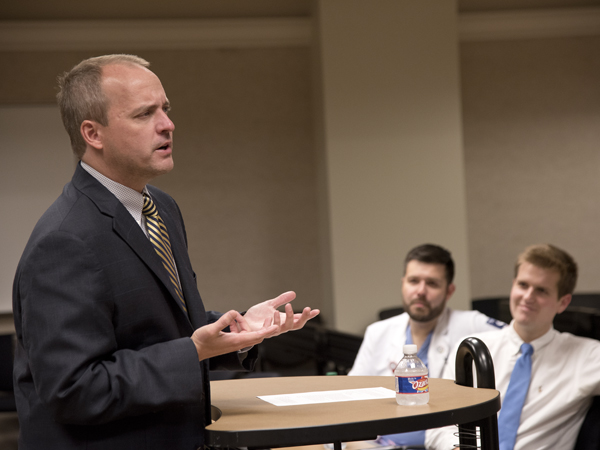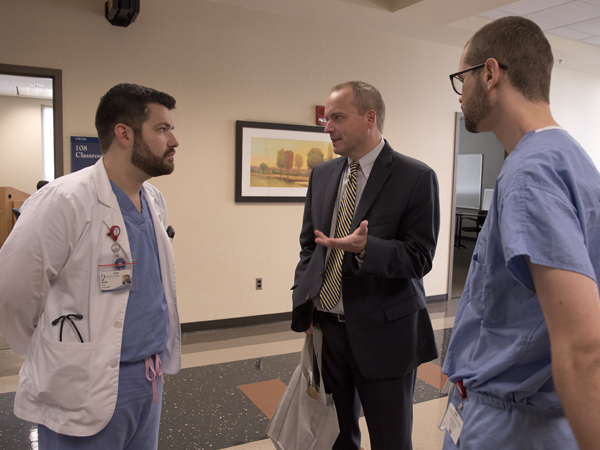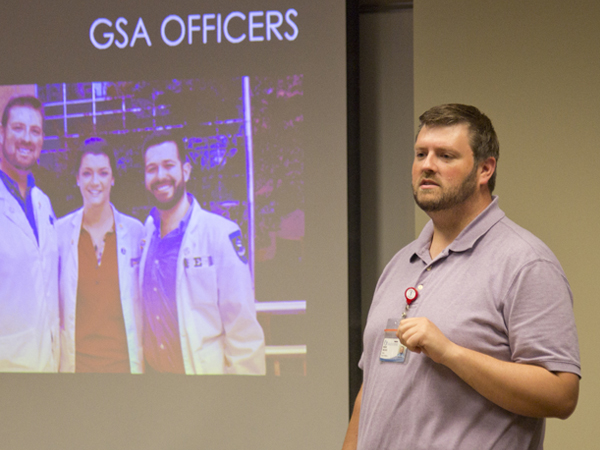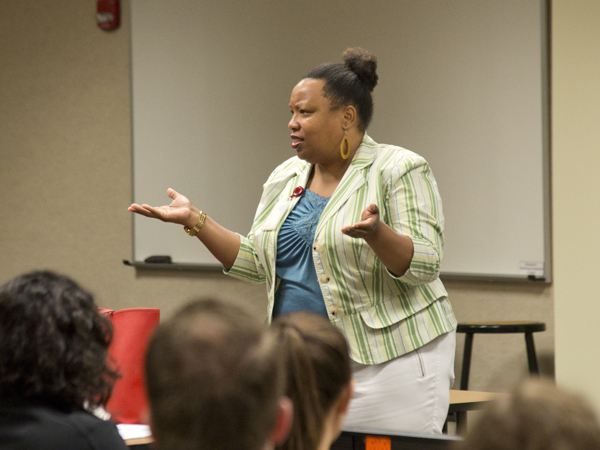LGBTQ rights champion describes victories, defeats, to Gay-Straight Alliance

Published in News Stories on September 15, 2016
Supporters of LGBTQ rights are “winning” the battle for inclusiveness in Mississippi, the state leader of a civil rights group told a UMMC audience on Wednesday.
Rob Hill, state director of the Human Rights Campaign Mississippi, part of a Washington, D.C.-based gay-advocacy organization claiming more than 1.5 million members and supporters, addressed about 30 listeners at the invitation of the UMMC Gay-Straight Alliance, a student-led organization supporting an LGBT-friendly environment.
Describing the progress HRC Mississippi has made since its formation in 2014, Hill said the organization recently helped defeat all but one of a dozen “anti-LGBT” bills in the state legislature.
The one that got away was religious objections House Bill 1523.
“I don't believe the majority of Mississippians wanted this bill,” he said.

Prior to his address Wednesday for the Gay-Straight Alliance Lunch Lecture Series, Rob Hill, center, is welcomed by medical students Ian Taylor, left, GSA co-president, and Jimbo Dickerson.
A native Mississippian who grew up in Forest in Scott County, Hill is a former United Methodist pastor who resigned in 2014 after revealing his sexual orientation at a news conference.
“I wanted to live openly and honestly as a gay man, and I couldn't do that as a United Methodist pastor,” he said.
After he and his partner decided to move to New York, they realized, “this is crazy,” he said. “We love our family, we love our friends. We hate the hate.” They remained in Mississippi - at the same time the HRC opened the office here and in two other states.
Since becoming leader of the advocacy group, Hill has been aided by HRC's $8.5 million rights-expanding initiative, Project One America. One sign of progress: several Mississippi cities and towns, including Jackson, have passed anti-discrimination resolutions or ordinances, he said.
A remaining goal is to get the state to safeguard protections, said Hill, who also wants to see the repeal of HB 1523 - even if it's ultimately overturned for good - “because it keeps us looking bad, as George Bush would say.”
Opponents of the legislation, which is in the hands of the Fifth Circuit Court of Appeals for now, say it is discriminatory. Mississippi is one of 26 states with no protections regarding housing, employment and the provision of many services “because of who you are and who you love,” Hill said.
The bill's supporters say it protects religious objections regarding LGBT rights: People with certain beliefs should not be required to grant marriage licenses to same-sex couples or other services to those clients.
“I think they really believe they're doing the right thing … that I might go to hell and others might,” Hill said in response to a question about his opposition to those whose motives are also rooted in their faith.
But he has learned that “when you have conversations, people's minds change,” he said.
Hill was the inaugural speaker for the Lunch Lecture Series organized by the GSA.
A forerunner to the GSA arose a couple of years ago with the support of Dr. James Keeton, then- vice chancellor and dean of the School of Medicine and now distinguished professor and advisor to the vice chancellor.

Third-year medical student Brent Necaise, co-president of GSA, explains the organization's goals, during the Aug. 26 alliance meeting.
During an Aug. 26 organizational meeting, Brent Necaise, GSA co-president with fellow third-year medical student Ian Taylor, described the coalition's overall goals to an audience of about two dozen: making UMMC more welcoming to all students, faculty and staff; addressing LGBT health disparities; and fostering a social and support network for LGBT students, faculty, staff and their allies.
Establishing such a group on this campus “is a big, big deal,” said Dr. Scott Rodgers, chair of the Department of Psychiatry and Human Behavior. Studies show that the presence of similar organizations at other institutions resulted in a reduction in victimization, Rodgers said, addressing the alliance members.
“They improve the overall climate for learning, for all students.”
Mitchell Moore, a third-year medical student who attended Hill's lecture, joined the GSA because “I thought it was important, especially as someone who is straight, to let people know, 'I support you.' And to encourage people to be themselves,” he said.
“Like many people in Mississippi, I had a conservative upbringing, but I realized that if I couldn't be myself and be accepted for what I am, it would be such a prison - to be persecuted for what I felt and couldn't change.
“There are probably a lot of people who don't believe, deep down, that being gay is wrong, but because it's such a widely-professed point of view, they have trouble denying it and going to an organization like the GSA. I would like to see that change and the GSA grow.”
The alliance has formed a partnership with the Mississippi AIDS Education Training Center, whose program director, Mauda Monger, informed GSA members that Mississippi has some of the highest rates of new HIV diagnoses for young black males in the country.
“You can all change the face of health care in this state, just by starting with the people in this room,” she said on Aug. 26.

Referring to HIV rates in the state, during the Aug. 26 GSA meeting, Mauda Monger, program director for the Mississippi AIDS Education Training Center at UMMC, tells her audience, "You all can change the face of health care in this state, just by starting with the people in this room."
During the past year or so, the GSA has organized a rapid HIV testing session on campus during World AIDS Day, established the lecture series and distributed a rainbow-themed lapel pin symbolizing the wearer's support for the LGBTQ community.
“It's been encouraging to see people wearing the pins around campus,” said Zach Long, a third-year medical student and GSA member, “and I've had a chance to talk to patients about the pin and what it means.
“In the South, being gay can be a strike against you. So it's important to put a face on [LGBT issues] and let patients know that there are those who understand, that [being gay] won't negatively impact their treatment.”
Still, there is a climate of fear that may be reflected in statistics cited by Necaise from a study released in August by the Centers for Disease Control and Prevention (http://www.cdc.gov/nchhstp/Newsroom/2016/lgb-youth-report-press-release.html): More than 40 percent of lesbian, gay and bisexual high school students have seriously considered suicide, and 29 percent reported having attempted suicide during the past 12 months.
“Many times these students have to face emotional non-support at school and at home,” said a UMMC employee whose gay son came out to her about three years ago.
Formerly employed in one of the state's public school districts, the woman said, “I saw these kids struggle.” So she and her co-workers there turned their office into a haven for these students. “They knew they were safe there,” she said.
Of the state's 560-plus public and private high schools, only about 15 have GSA's or similar groups, Necaise said. In response, Rodgers has suggested that members here work to help create similar alliances in more of these schools.
“It's a matter of us organizing to do this and wanting to do this,” Necaise said.
------------
For more information about the alliance, go to www.umc.edu/Education/Schools/Medicine/Office_of_Medical_Education/Student_Interest_Groups.aspx or contact faculty advisors Dr. Eric Blaudeau, eblaudeau@umc.edu; or Dr. Liz Robertson, terobertson@umc.edu.
UPCOMING
The GSA Lunch Lecture Series continues at 10:30 a.m.-11:30 a.m. Tuesday, Sept. 27 in Room 107 of the Classroom Wing with guest lecturer Dr. Harvey Makadon, professor of medicine at Harvard Medical School and director of education and training programs at the Fenway Institute, including Fenway's National LGBT Health Education Center.


